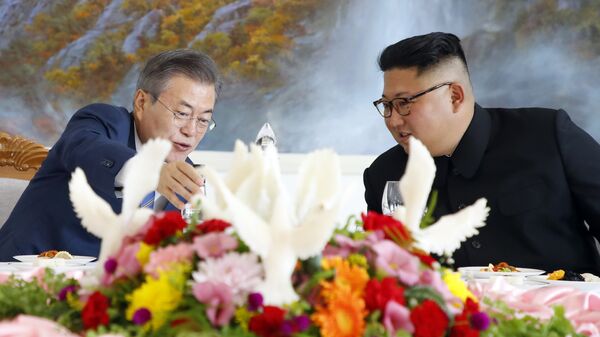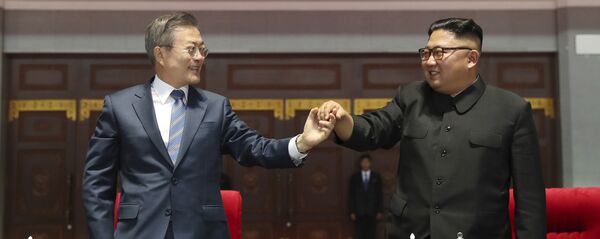Sputnik: The South Korean presidential spokesperson called the agreements achieved by North and South Korea nothing less than a proclamation of an end to the state of war. To what extent do you share this feeling?
Howard Stoffer: I think that's an overstatement; it's a very symbolic act; the two Koreas are basically saying they want to defuse the border, they want to defuse the situation and don't feel that they are in a state of hostilities anymore, but in order to really end the war, in order to get a peace treaty, you have to get the United Nations Command involved, you have to get China, the United States, Australia, who were all combatants in that war; so it's a much more complicated process, but it was a very symbolic statement as the whole visit of President Moon, the president of the Republic of Korea, to the North Korean side was a symbolic visit and that's one of the symbolic things that they did, he even called it himself a political statement, so it's not a legal statement in any way.
Howard Stoffer: I think you're right, the kind of comments that were occurring just a year ago were frightening, quite frankly. We could see a war or even worse a nuclear exchange take place on the peninsula, and now we have a different kind of rhetoric and it's a peaceful rhetoric, which is the right direction to go in. But we have to remember that the North Koreans have been putting out this kind of stuff not only under Kim Jong-un, but under Kim Jong-il — his father and under Kim Il-sung — his grandfather.
Sputnik: I was thinking about this the other day; when you think about this young North Korean leader Kim Jong-un and the aggressive comments that he was making and all of a sudden this has completely unraveled and turned around; it's an amazing situation when you think about his strategy 12 months ago and then he's completely turned it around. Why has this young man suddenly turned almost 180 degrees in the way he's positioning this whole thing, because it's an amazing story really, when you think about it?
Howard Stoffer: Yes, you're right, and I think we have to look back and remember that President Moon invited the North Koreans to come to the Olympics, the winter Olympics that were being held in the city that sounds like the North Korean capital, but it's Pyeongchang.
And then they sent an entire team and they had a team that was not very good, but it was a combined team to play hockey in the games, they marched under a flag that they had used before in the Olympics, a sort of a Korean flag, and the sister of Kim Jong-un came to South Korea and was treated with tremendous respect and dignity, and honour, and so I think that side of Kim Jong-un was basically massaged, he saw an opportunity, because the South and the president of South Korea was trying so hard to really find a way to change the rhetoric and turn the tide, and so he responded.
READ MORE: Moon, Kim Trek Mount Considered Place of Origin of Korean People (PHOTOS)
And they responded in a small way and then eventually they agreed to have their two meetings. First one and then another historic meeting on the border at the DMZ, the demilitarized zone, between North and South and then, of course, that led to the meeting between United States President Trump and the North Korean leader, Kim Jong-un.
You may read in your history books that's how the United States reached out to China back in the 1970s; it started with ping-pong diplomacy, when the American ping-pong team went to Beijing and it was the first time that an American team had ever entered Communist China at the time, and that lead to eventually Henry Kissinger arranging a meeting between Mao Zedong and Richard Nixon, the president.
So I think these are the kind of steps that need to be taken. The same thing when Richard Nixon met with Leonid Brezhnev of the Soviet Union back in the 1970s; again, another step forward to try to find a common ground, that we have common ground and we can build on common ground and reduce tensions between countries, and I think that's what Kim Jong-un, who was a very canny and a very smart leader, decided that he wanted to take advantage of.
The views and opinions expressed by the speakers do not necessarily reflect those of Sputnik.





